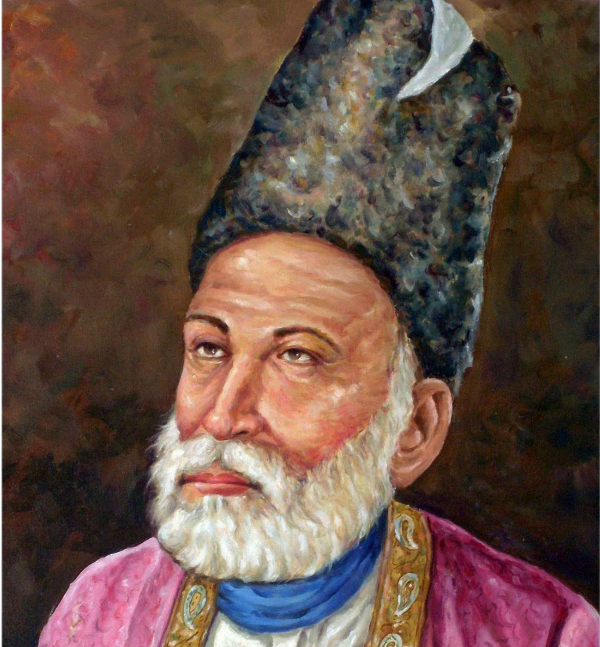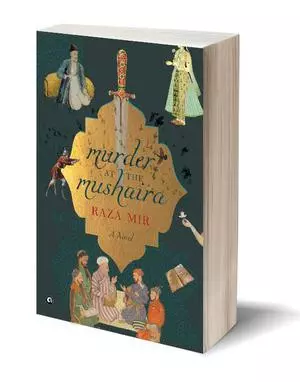Murder at the Mushaira / Raza Mir / Aleph Book Company / Fiction / ₹799
Frontlist | Mirza Ghalib’s on the case : Historical Novel
Frontlist | Mirza Ghalib’s on the case : Historical Novelon Feb 26, 2021

Raza Mir’s ‘Murder at the Mushaira’ works well as a historical novel that captures the sunset years of the Mughal empire, but falters as a whodunnit
* Mir introduces an unexpected and delightful addition to the roll call of historical detectives — Mirza Ghalib
* The novel is set in Delhi — early May, 1857. While its residents are outwardly going about business as usual, bigger events are simmering underneath
* A particularly odious and not very talented poet is found murdered the morning after a night-long mushaira
Nestling within the various folds of the crime fiction genre lies the equally delectable historical crime novel. From ancient Egypt to 14th-century Italy to various ages in English history, the settings of these novels traverse a vast swathe of time. CJ Sansom’s Matthew Shardlake solves murders and uncovers treasonous plots in Henry VIII’s England. Over the course of six books, Shardlake is called upon to investigate in different parts of a country in turmoil. Umberto Eco’s The Name of the Rose is yet another brilliant work in this genre, though it goes well beyond a crime novel and becomes a meditation on history, philosophy, religion and codebreaking. A number of writers have engaged with this sub-genre and provided entertainment to readers.
Needless to say, it is therefore with great anticipation that one begins Murder at the Mushaira by Raza Mir. Indian crime fiction is not as prolific as it is in the West, and here is a novel that places a crime in the tumultuous days leading up to the uprising of 1857. Mir, who is the author of Ghalib: A Thousand Desires as well as other books on Urdu poetry, introduces an unexpected and delightful addition to the roll call of historical detectives — Mirza Ghalib.
The novel is set in Delhi — early May, 1857. While its residents are outwardly going about business as usual, bigger events are simmering underneath, unnoticed. Cryptic messages are flowing in from towns afar such as Meerut and Mathura where soldiers in cantonments are already rising up against the British commanders. Horsemen are carrying coded messages, sleeper cells are getting activated, spies are working overtime. Yet, the life of nobles and commoners alike is also going on as usual — in mushairas and in the daily struggles to make a living.
In the midst of all this, a murder takes place. A particularly odious and not very talented poet is found dead the morning after a night-long mushaira, a beautiful dagger sticking out of his chest. His death sends the British into a tizzy; Chainsukh, the Indian police officer in charge, is warned that he has to find the killer, or else face the consequences. The officer, in despair, turns to an old family friend — Ghalib. The poet laureate is ageing, and beset with money worries, yet his wit and thinking remain sharp. Previously called in to solve crimes of theft, he has made something of a name for himself as a detective. Ghalib sets off to investigate the death of a fellow poet, a crime that seems to be worrying both the British and the Indians greatly.
The novel proceeds briskly with a vast, though at times confusing, cast of characters, replete with their back stories. There is the courtesan plying her trade in the shadow of a mosque, a painter of miniatures with secrets of her own, an erstwhile spy and British sympathiser repenting his former associations, a forensic scientist and his assistant from a Delhi college who tease out the secrets of the crime as they perfect their newly learnt science. Many of these characters are based on real-life people who lived in Delhi at the time, the foremost being the central character of Ghalib.
Much of the delight one derives from the book hinges on the personality of the poet that emerges. He is vain, sometimes ridiculous, not very brave, and definitely down-and-out on his luck as far as money goes, despite being the poet laureate of a Mughal king who, coincidentally, is himself on the edge of penury. But he is also brilliant and empathetic, a true and loving friend, and, as a detective, a worthy addition to the legions that have come before him in this genre.
The events in the novel move in fits and starts as the author pauses often to describe a lovers’ tryst here, and the story of an orphaned British boy who enters the Company’s service there. He takes the reader into the winding lanes of Chandni Chowk, the garrisons, and the British administrative offices. He describes in loving detail the relationship between Ghalib and his wife Umrao — a tender love story that is overlaid with the detritus of years of togetherness. In the midst of all this, the detection of the crime seems to disappear for stretches. And when the murderer is finally revealed, there is a good chunk of the book still left and the reader is waiting for the story to come together.
 But the book scores in its detailed and lively depiction of a time in history. The chaos of the events of 1857, poised to happen, are around the corner, and the reader knows that many of the characters in the book will soon meet with a sad end. People and their words stand out, particularly the poetry, and the fierce love for it that once characterised the city. Where it falters is as a murder mystery, the kind the title and blurb promise so fulsomely. The tension, the sense of expectation from a revelation, the red herrings and the process of detection get subsumed within the conspiracies and events that are afoot. As a historical novel, this is a fine depiction of the dying days of the Mughals, and the ascendancy of the Raj. It succeeds as a record of the lives of the people who lived in the wondrous city of Dilli as it once was. As a new and clever way of seeing one of Urdu poetry’s greatest names, it hits its mark delightfully. If only it worked just as well as a work of crime fiction.
Sudeshna Shome Ghosh is a Bengaluru-based editor
But the book scores in its detailed and lively depiction of a time in history. The chaos of the events of 1857, poised to happen, are around the corner, and the reader knows that many of the characters in the book will soon meet with a sad end. People and their words stand out, particularly the poetry, and the fierce love for it that once characterised the city. Where it falters is as a murder mystery, the kind the title and blurb promise so fulsomely. The tension, the sense of expectation from a revelation, the red herrings and the process of detection get subsumed within the conspiracies and events that are afoot. As a historical novel, this is a fine depiction of the dying days of the Mughals, and the ascendancy of the Raj. It succeeds as a record of the lives of the people who lived in the wondrous city of Dilli as it once was. As a new and clever way of seeing one of Urdu poetry’s greatest names, it hits its mark delightfully. If only it worked just as well as a work of crime fiction.
Sudeshna Shome Ghosh is a Bengaluru-based editor
Read More: PM to inaugurate The India Toy Fair 2021 on 27th February
Source: Hindu Business Line
Author
Authors
Bestseller
Book
book news
Books
Covid-19
Frontlist Book News
Frontlist Books
Frontlist India news
Google news
Mirza Ghalib
Mughal empire



.jpg)






.jpg)

.jpg)
.jpg)
.jpg)
.jpg)
.jpg)










Sorry! No comment found for this post.